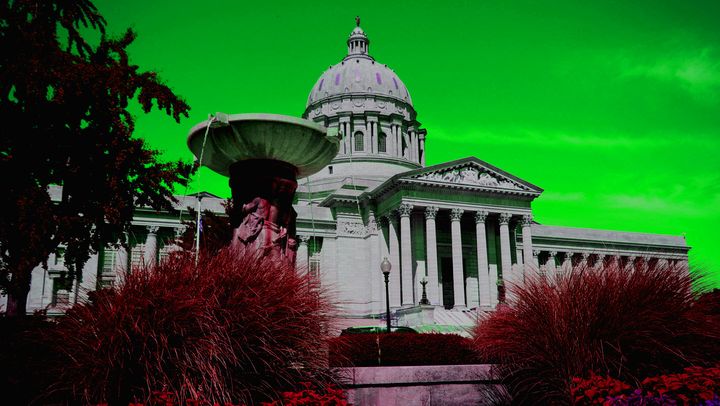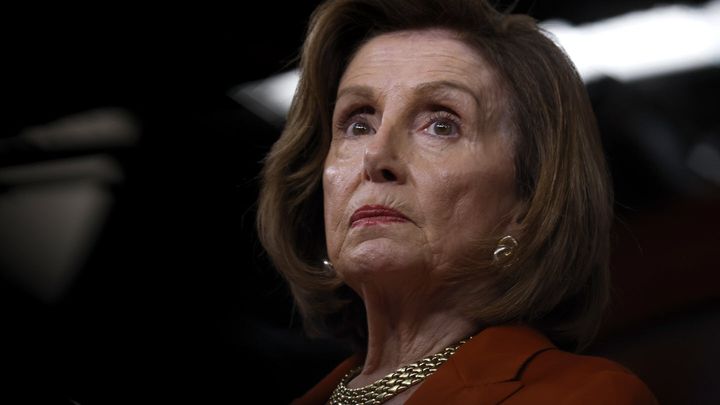On the ballot in Missouri is a deceptive measure that could confuse people who care about preventing government corruption and making the state’s politicians more accountable to voters. The ballot language for Amendment 3, the “Redistricting Process and Criteria, Lobbying, and Campaign Finance Amendment,” begins with two bullet points describing how it would ban lobbyist gifts and lower campaign contribution limits. But a third and final bullet point describes what the measure is really all about. Amendment 3 would “change the redistricting process voters approved in 2018 by…transferring responsibility for drawing state legislative districts from the Nonpartisan State Demographer to Governor-appointed bipartisan commissions,” the ballot reads.
Amendment 3 asks voters to approve a bill the legislature passed earlier this year to reverse an anti-gerrymandering measure that voters approved with 62% support on the 2018 ballot. It would give redistricting power back to politician-appointed commissions, one nominated by the Senate and one by the House, whose members would be approved by the governor, restoring for the Republican politicians who control the state government power to draw their own district lines.
It would also change which Missouri residents are counted as districts are apportioned. For decades, districts have been determined based on total population size, but the amendment would revise the constitution to say that “districts…shall be drawn on the basis of one person, one vote,” language that could be used to exclude people who are not eligible to vote, like children, non-citizens, and incarcerated individuals. A 2015 Harvard study of the potential impact of such a change found that Republicans would benefit. The percentage of Missouri Senate seats held by Democrats could be reduced half a percent when excluding non-citizens from district counts, the study found.
The amendment’s other provisions, though appearing to be meaningful reforms, do next to nothing. It would eliminate the state’s $5 cap on the value of gifts that lobbyists can give to legislators and replace it with a total ban, and it would lower campaign contribution limits from $2,500 to $2,400.
The Money Behind Amendment 3
While the anti-gerrymandering campaign working to oppose Amendment 3 has raised millions of dollars including donations from hundreds of individuals from the state giving $100 or less, as well as large donations from several national political groups and unions, the campaign promoting Amendment 3 has not received a single donation from a Missouri resident this election cycle.
Most of the funding for the pro-Amendment 3 campaign committee, Fair Missouri, has come from the Missouri Republican State Committee, but it also has ties to a larger web of GOP “dark money” groups. A nonprofit called Missouri Alliance for Freedom (MAF), which does not disclose its donors, has given the campaign $40,978. According to tax documents, MAF received $317,031 in 2019 for “assistance on ballot measures” from American Democracy Alliance (ADA), a shadowy, Missouri-based group that says in its 990 forms that its mission is to “collect donations from individual and corporate donors and then donate such funds to other social welfare organizations that support conservative causes.” Besides MAF, other organizations ADA has donated to include the Koch brothers-founded Americans for Prosperity, Wellspring Committee, a dark money hub that has been a major funder of a group that runs campaigns supporting conservative judges, and Cornerstone 1791, which operates a conservative activism group in Missouri called Liberty Alliance.
MAF’s president is Kristen Ansley, the executive director of Private Citizen, a Kansas-based c3 that finances lawsuits on behalf of individuals and groups challenging laws they consider to be unjust forms of government overreach. The other MAF board members are Scott Turk, previously director of boards and commissions under former Republican Governor Eric Greitens, and James Thomas III, a Missouri political operative who was part of a 2017 settlement with the Federal Elections Commission after the commission determined there was probable cause to believe he had helped a donor conceal their identity by funneling super PAC contributions through a non-disclosing conduit.
ADA board member Jewell Patek is a former state representative who is now a lobbyist in Missouri for dozens of corporations and trade groups, including Acadia Health, biotech company Alkermes, and publicly-traded petroleum company Magellan Midstream Partners. Patek is also a board member at Private Citizen.
MAF has an affiliated PAC called Missouri Alliance for Freedom – Grace River PAC that in 2019 received $150,000 from companies owned by GOP megadonor Stephen Herzog.
Fair Missouri’s only other donor is Advance Missouri, a now defunct PAC that in 2018 received a $50,000 donation from the Virginia-based Fair Lines America (FLA), which works to prevent the establishment of independent redistricting commissions like the one Missouri voters approved in 2018. FLA’s executive director, Adam Kincaid, is also executive director of the National Republican Redistricting Trust, which describes itself as “the central Republican resource to coordinate and collaborate on a 50-state redistricting effort; focusing on the GOP’s redistricting-related legal and data needs.” FLA does not disclose its donors, but an investigation by the Center for Media and Democracy found two of its donors: Legacy Foundation, an obscure Iowa organization, and the Lynde and Harry Bradley Foundation, a major conservative grantmaking operation that spends millions each year to fund think tanks and state policy groups that work on privatizing education and weakening collective bargaining rights for workers.
The nonpartisan organization Common Cause links the Missouri measure to a Republican redistricting strategist who gained renewed attention last year after his death, when his estranged daughter discovered hard drives describing his key role in the Trump administration’s attempt to add a citizenship question to the census. “The scheme to draw districts based on total population was originally conceived by GOP gerrymandering mastermind Thomas Hofeller, who determined that it could be used to ‘advantage Republicans and non-Hispanic whites,” the group writes on its website where it urges a “no” vote on the measure.
The Clean Missouri initiative, a coalition of scores of groups that led the campaign in support of the nonpartisan redistricting amendment in 2018 and is calling on voters to reject Amendment 3, says on its website of this year’s measure, “They want to replace voter-approved anti-gerrymandering reforms with a deceptive new scheme for our state constitution.”
A Fix for Democracy – Following the Supreme Court’s 2010 decision in Citizens United, which banned limits on political spending by corporations, unions, and other groups, “dark money” has dramatically increased in state elections. To help voters understand who is funding campaigns and political ads, states can pass laws that require all groups who spend money on politics, including LLCs and nonprofits, to disclose the original source of their funding. Learn more—>
Read more:
Arizona Judge Reinstates GOP Law Shielding ‘Dark Money’
Billionaire Oligarchs and Anonymous Megadonors Behind Amy Coney Barrett Ads
In Heavily Gerrymandered Wisconsin, a Bipartisan Grassroots Movement Fights for Fair Maps



